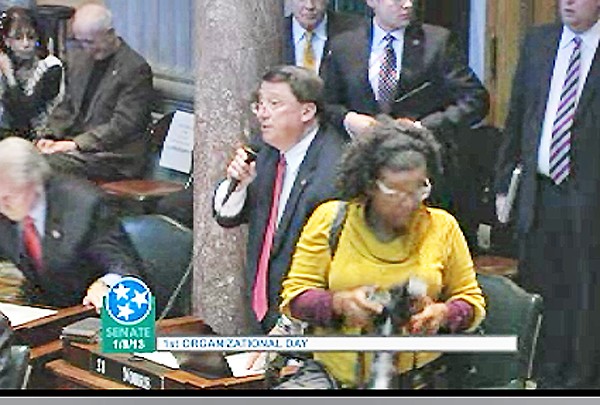
The Tennessee General Assembly has convened for its 2013 session, and, as we and everybody else have observed, it will open up with Republican “super-majorities” in both state House and state Senate, able to achieve any outcome the GOP majority desires without a thought to potential opposition from Democrats.
Moreover, such rhetorical objections as might be expected from the Democratic side may be offset to some degree by the committee appointments made by both speakers — Beth Harwell of Nashville in the House, Ron Ramsey of Blountville in the Senate, each reelected handily on Monday’s opening day of the session.
Among the dwindling band of Democrats — 7 in the 33-member House; 24 in the 99-member Senate — only a few are likely to play damn-the-torpedoes with the GOP leadership. Many, likely most, will play the hands they are dealt cautiously and will opt for a go-along-to-get-along strategy, leveraging such committee assignments as they can get to maximum benefit.
As was pointed out here last week in relation to pending firearms legislation, where significant differences exist among Republicans, such stalemates and conflicts as may ensue in the coming session will not be partisan ones per se but intra-party on the GOP side.
It is no secret that Senate majority leader Mark Norris (R-Collierville) will, as before, play the role of point man for the continuing efforts of Shelby County’s suburban municipalities to exercise some degree of real independence — if not now, then later — from the forthcoming Unified School System.
Nor is it a secret as to the majority leader’s likely direction, given the decision rendered late last year by U.S. district judge Hardy Mays invalidating Norris-sponsored legislation of a year ago to enable and advance the speedy implementation of new suburban special school districts. Mays’ finding was that the key Norris bill of 2011 was unconstitutional, because it manifestly applied only to Shelby County and thus avoided statutory requirements for ratification by the local county’s chief legislative body — in this case, the Shelby County Commission, a clear majority of whom have opposed the suburban districts. Indeed, it was a commission lawsuit that was the basis for Mays’ ruling.
The route left open for Norris and his suburban allies in the Shelby delegation is that of legislation that would expand the state’s already burgeoning charter-school initiative while simultaneously diminishing the power of local school boards to reject charter school applications. But a bill broad enough to allow the county’s suburbs to form de facto charter-school districts would inevitably run into stout resistance from school boards elsewhere in Tennessee — including those (most of them these days) in areas that elect Republican legislators.
Nor is the way clear for another Shelby Republican legislator with ambitions for bills of a transformative kind. State senator Brian Kelsey (R-Germantown) will once again try to advance his proposal, first attempted in 2011, to publicly fund vouchers on a limited basis for private schools.
That effort passed the Senate but, before being considered by the House, ended up in “summer study,” sometimes a euphemism for the graveyard but in this case a precursor for action by a specially convened gubernatorial task force, which met last summer to consider possible voucher legislation but reached no definite conclusion.
As in the case of charter school legislation, resistance of school boards statewide could prove significant, and partisan solidarity cannot be counted on to advance Kelsey’s bill, or any other piece of voucher legislation. Kelsey may also have difficulty with a bill that would prohibit the state from expanding TennCare in conformity with a provision of the Affordable Care Act.
Governor Bill Haslam has clearly not made up his mind to opt out of the provision, made optional by the Supreme Court, which would provide participating states with 100 percent of the funding for expanding their Medicaid operations, scaling that down to 90 percent over a period of years. Moreover, the governor is under pressure from representatives of the state’s hospitals and health-care industry to carry out the expansion, though there are many archconservatives like Kelsey in the legislature who oppose it on principle.
In any case, the governor wants time to consider the various possible combinations and does not want anyone to rush his judgment.
The bottom line: Despite the helplessness of Democrats as a body, there will be a sufficient number of issues regarding which conflict in this year’s General Assembly — of the intramural sort — will be inevitable.
It won’t be like Alabama vs. Notre Dame, in other words. More like Alabama’s varsity versus its taxi squad. Which is to say, closer and maybe more intense.

Norris on Tuesday at opening of 2013 legislative session